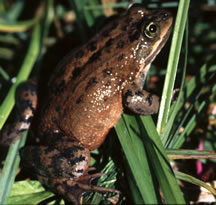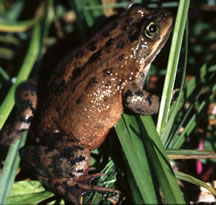Rana pretiosa has enjoyed a high success rate in a captive breeding program in a Washington state prison.
A frog species reared in a Washington state prison has been proposed by the U.S. Fish and Wildlife Service as a candidate for endangered species protection. The USFWS as part of its proposal to list the frog also wants to designate more than 68,000 acres and 24 stream miles as protected critical habitat, the center said. The service has proposed 14 critical habitats for the frog, including sites in Chilliwack, Nooksack, Samish, Black and White Salmon watersheds in Washington and the Deschutes, Little Deschutes, McKenzie, Willamette, Williamson and Klamath watersheds in Oregon.

Oregon Spotted Frog. Photo by USFWS/Wikimedia
The Oregon spotted frog (Rana pretiosa) has been the subject of a successful captive breeding program in Washington’s Cedar Creek Corrections Center for the past several years. The program in the prison apparently enjoys a higher success rate in the rearing of the frogs than captive breeding programs in zoos. The frogs, which were a common species in wetland habitats from Oregon to British Columbia, have been disappearing from their native rate at alarming rates, according to the Center for Biological Diversity.
Want to Learn More?
Two High Sierra Amphibians Proposed for Endangered Species Act Protections
South African Herper's Desert Rain Frog Video Goes Viral
The center, which reached a settlement with the USFWS to speed protection of the frog and more than 700 other species, says that there are fewer than 100 areas in which the frog can be found in the wild. Its dwindling numbers are due to habitat loss, introduced fish, contaminants, and loss of wetlands next to rivers and streams. A decision will be made by the USFWS as soon as commenting on the proposal is closed which should conclude sometime next year. The Oregon spotted frog averages between 1.75 and 2 inches in length. Their coloration varies based on their age. Adult specimens are brown to reddish brown and become redder as they age. They have black spots on their heads and backs.


